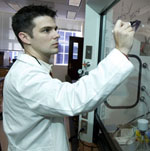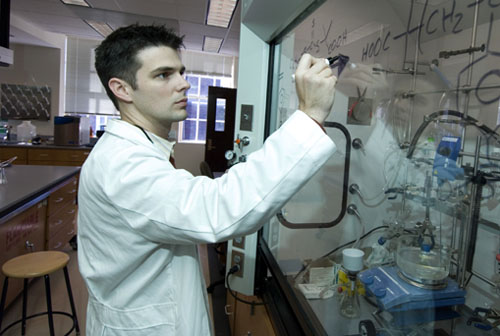Chemistry professor named 2010-2012 Alfred P. Sloan Research Fellow
Chemistry Prof. Brent Sumerlin receives prestigious award to support his research, including insulin delivery.

DALLAS (SMU) — Brent Sumerlin, professor of Chemistry in SMU’s Dedman College, has been named a 2010-2012 Alfred P. Sloan Research Fellow. This exceptionally competitive award will provide Sumerlin a grant of $50,000 over two years to support his research, some of which could lead to the use of nano-scale polymer particles to automatically deliver insulin to diabetics.
 See a video of Prof. Sumerlin and graduate student Jennifer Cambre talking about Sumerlin's research. |
The Sloan Research Fellowships are designed to stimulate fundamental research by early-career scientists and scholars of outstanding promise. These two-year fellowships are awarded yearly to 118 researchers in recognition of distinguished performance and unique potential to make substantial contributions to their field.
The fellowship places Sumerlin in the company of some of the most distinguished scientists in the country. Thirty-eight Sloan fellows have been awarded the Nobel Prize in their respective fields since the fellowships were established in 1955.
“Professor Sumerlin's Sloan award represents a major recognition of the creativity and promise of his research,” said James Quick, SMU associate vice president for research and dean of graduate studies. “He is one of our most impressive young faculty members, and his work on polymers is an example of the innovative research we are trying to foster at SMU.”
Sumerlin, 33, works with an SMU team of postdoctoral research associates, graduate and undergraduate students who fuse the fields of polymer, organic and biochemistries to develop novel materials with composite properties. A polymer is a group of molecules that are strung together to form long chains and more complicated structures; they behave differently depending on the types of molecules they’re made of and how they are assembled.
Sumerlin’s team has been investigating how nano-scale polymer particles can be triggered to come apart in response to a chemical stimulus. One of the potential applications of this technology is an automatic treatment solution for diabetics that would release insulin from tiny polymer spheres as soon as they encounter dangerous levels of glucose in the bloodstream. Researchers worldwide are looking for methods of insulin delivery that will relieve diabetics of frequent blood-sugar monitoring and injections.
Another aspect of Sumerlin’s research involves making polymers with the ability to come apart and put themselves back together again – a technique that Sumerlin believes can be used to construct materials that are self-repairing. "We could potentially think about coatings for airplane wings that are damaged by debris during flight," Sumerlin explains. "After landing, we could quickly treat the coating, causing it to re-form itself."
Selection procedures for the Sloan Research Fellowships are designed to identify those who show the most outstanding promise of making fundamental contributions to new knowledge. Sloan Research Fellows, once chosen, are free to pursue whatever lines of inquiry are of the most compelling interest to them.
Sumerlin was awarded in December 2008 a National Science Foundation Faculty Early Career Development Award, given to junior faculty members who exemplify the role of teacher-scholars in American colleges and universities. Sumerlin received his doctorate from the University of Southern Mississippi in 2003, accepted a position as visiting assistant professor at Carnegie Mellon University for the next two years and joined SMU in 2005.
Related Links:
# # #